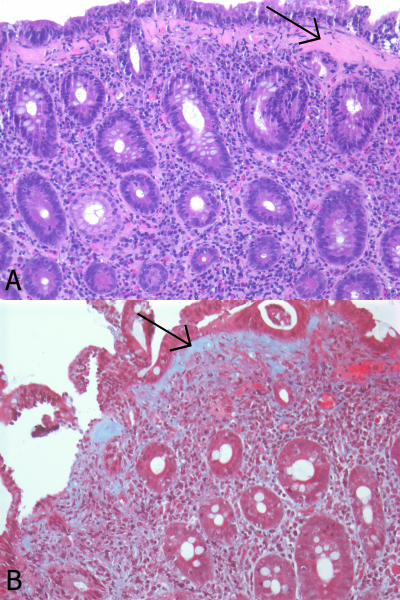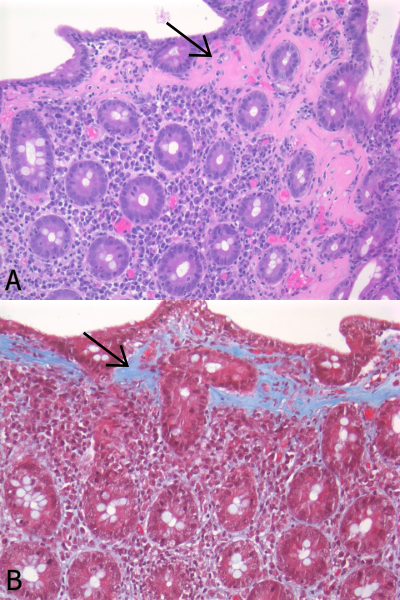Tuesday Poster Session
Category: IBD
P5530 - Successful Induction and Maintenance of Clinical Remission With Adalimumab and Ustekinumab in Steroid-Refractory Collagenous Enterocolitis: A Rare 10-Year Follow-Up Case Report
Tuesday, October 28, 2025
10:30 AM - 4:00 PM PDT
Location: Exhibit Hall
.jpg)
Jonathan S. Lee, MD (he/him/his)
Rush University Medical Center
Chicago, IL
Presenting Author(s)
Jonathan S. Lee, MD1, Giovannie Isaac-Coss, MD1, Zoe Post, MD, MSc1, Shriram Jakate, MD1, Ali Keshavarzian, MD, MACG2
1Rush University Medical Center, Chicago, IL; 2Rush University Medical Center; Rush Center for Integrated Microbiome and Chronobiology Research, Chicago, IL
Introduction: Collagenous colitis (CC) is a variant of microscopic colitis marked by chronic, watery diarrhea that often manifests with normal-appearing colonic mucosa on colonoscopy and a thickened subepithelial collagen band on histology. CC predominantly affects middle-aged to older women, with an incidence of 5–10 per 100,000 person-years and a prevalence of 40–200 per 100,000 adults in North America and Europe. While CC is well-characterized, concurrent small bowel collagen deposition (collagenous enterocolitis, CE) is exceedingly rare and associated with severe malabsorption. Only limited case reports exist, leaving its etiology and optimal management unclear. We present a rare case of CE successfully managed and maintained in remission with biologics after infliximab non-response.
Case Description/
Methods: A 56-year-old Hispanic female presented with an 8-month history of nausea, vomiting, and diarrhea after influenza immunization. Initial inflammatory labs (CRP, ESR) were within normal limits. Duodenal biopsies showed patchy villous atrophy and a thickened subepithelial collagenous layer, consistent with collagenous sprue. Symptoms partially improved with daily glucocorticoids, but tapering led to recurrence. Repeat duodenal and colonic biopsies were notable for collagenous duodenitis, ileitis, and colitis, confirming CE (Figures 1, 2). Infliximab was initiated with partial clinical improvement, but persistent histologic inflammation prompted a switch to adalimumab (ADA). This led to gradual clinical remission but no histologic improvement. The patient was then transitioned to ustekinumab (UST) with sustained clinical remission and histologic improvement in colitis.
Discussion: CE represents a rare form of microscopic enterocolitis characterized by profound malabsorption from simultaneous collagen deposition in the small bowel and colon. Its pathogenesis is poorly understood but may involve autoimmune mechanisms. While glucocorticoids, particularly budesonide, are first-line therapy, many patients relapse or require long-term treatment. Our case underscores the role of biologic therapies in steroid-refractory CE, notably highlighting the successful induction of clinical remission with ADA and histologic improvement with UST. Histologic healing is often delayed and may persist even when the patient is symptom-free. However, IL12/23 inhibitors may improve histologic findings as evidenced in our case. Future research should clarify the prevalence, prognosis, and optimal management of this rare condition.

Figure: Figure 1. Collagenous sprue: (A) Duodenal mucosa showing markedly shortened villi with flat surface, severe chronic duodenitis and thickened subsurface band of collagen consistent with collagenous sprue (H&E stain, x200 magnification). (B) Trichrome stain of the duodenal mucosa highlighting the thickened subsurface collagen band, colored blue (Trichrome stain x200 magnification).

Figure: Figure 2. Collagenous colitis: (A) Random colonic biopsy showing chronic colitis and thickened subsurface band of collagen consistent with collagenous colitis (H&E stain, x200 magnification). (B) Trichrome stain of the colonic mucosa highlighting the thickened subsurface collagen band, colored blue (Trichrome stain x200 magnification).
Disclosures:
Jonathan Lee indicated no relevant financial relationships.
Giovannie Isaac-Coss indicated no relevant financial relationships.
Zoe Post indicated no relevant financial relationships.
Shriram Jakate indicated no relevant financial relationships.
Ali Keshavarzian indicated no relevant financial relationships.
Jonathan S. Lee, MD1, Giovannie Isaac-Coss, MD1, Zoe Post, MD, MSc1, Shriram Jakate, MD1, Ali Keshavarzian, MD, MACG2. P5530 - Successful Induction and Maintenance of Clinical Remission With Adalimumab and Ustekinumab in Steroid-Refractory Collagenous Enterocolitis: A Rare 10-Year Follow-Up Case Report, ACG 2025 Annual Scientific Meeting Abstracts. Phoenix, AZ: American College of Gastroenterology.
1Rush University Medical Center, Chicago, IL; 2Rush University Medical Center; Rush Center for Integrated Microbiome and Chronobiology Research, Chicago, IL
Introduction: Collagenous colitis (CC) is a variant of microscopic colitis marked by chronic, watery diarrhea that often manifests with normal-appearing colonic mucosa on colonoscopy and a thickened subepithelial collagen band on histology. CC predominantly affects middle-aged to older women, with an incidence of 5–10 per 100,000 person-years and a prevalence of 40–200 per 100,000 adults in North America and Europe. While CC is well-characterized, concurrent small bowel collagen deposition (collagenous enterocolitis, CE) is exceedingly rare and associated with severe malabsorption. Only limited case reports exist, leaving its etiology and optimal management unclear. We present a rare case of CE successfully managed and maintained in remission with biologics after infliximab non-response.
Case Description/
Methods: A 56-year-old Hispanic female presented with an 8-month history of nausea, vomiting, and diarrhea after influenza immunization. Initial inflammatory labs (CRP, ESR) were within normal limits. Duodenal biopsies showed patchy villous atrophy and a thickened subepithelial collagenous layer, consistent with collagenous sprue. Symptoms partially improved with daily glucocorticoids, but tapering led to recurrence. Repeat duodenal and colonic biopsies were notable for collagenous duodenitis, ileitis, and colitis, confirming CE (Figures 1, 2). Infliximab was initiated with partial clinical improvement, but persistent histologic inflammation prompted a switch to adalimumab (ADA). This led to gradual clinical remission but no histologic improvement. The patient was then transitioned to ustekinumab (UST) with sustained clinical remission and histologic improvement in colitis.
Discussion: CE represents a rare form of microscopic enterocolitis characterized by profound malabsorption from simultaneous collagen deposition in the small bowel and colon. Its pathogenesis is poorly understood but may involve autoimmune mechanisms. While glucocorticoids, particularly budesonide, are first-line therapy, many patients relapse or require long-term treatment. Our case underscores the role of biologic therapies in steroid-refractory CE, notably highlighting the successful induction of clinical remission with ADA and histologic improvement with UST. Histologic healing is often delayed and may persist even when the patient is symptom-free. However, IL12/23 inhibitors may improve histologic findings as evidenced in our case. Future research should clarify the prevalence, prognosis, and optimal management of this rare condition.

Figure: Figure 1. Collagenous sprue: (A) Duodenal mucosa showing markedly shortened villi with flat surface, severe chronic duodenitis and thickened subsurface band of collagen consistent with collagenous sprue (H&E stain, x200 magnification). (B) Trichrome stain of the duodenal mucosa highlighting the thickened subsurface collagen band, colored blue (Trichrome stain x200 magnification).

Figure: Figure 2. Collagenous colitis: (A) Random colonic biopsy showing chronic colitis and thickened subsurface band of collagen consistent with collagenous colitis (H&E stain, x200 magnification). (B) Trichrome stain of the colonic mucosa highlighting the thickened subsurface collagen band, colored blue (Trichrome stain x200 magnification).
Disclosures:
Jonathan Lee indicated no relevant financial relationships.
Giovannie Isaac-Coss indicated no relevant financial relationships.
Zoe Post indicated no relevant financial relationships.
Shriram Jakate indicated no relevant financial relationships.
Ali Keshavarzian indicated no relevant financial relationships.
Jonathan S. Lee, MD1, Giovannie Isaac-Coss, MD1, Zoe Post, MD, MSc1, Shriram Jakate, MD1, Ali Keshavarzian, MD, MACG2. P5530 - Successful Induction and Maintenance of Clinical Remission With Adalimumab and Ustekinumab in Steroid-Refractory Collagenous Enterocolitis: A Rare 10-Year Follow-Up Case Report, ACG 2025 Annual Scientific Meeting Abstracts. Phoenix, AZ: American College of Gastroenterology.
